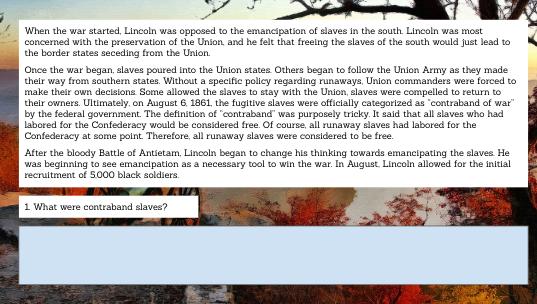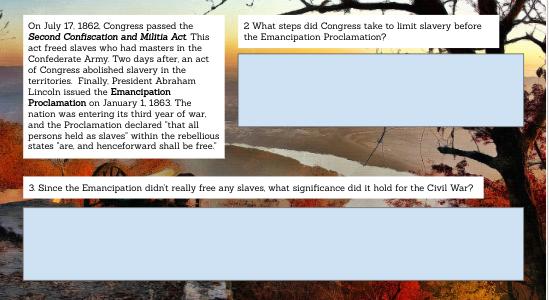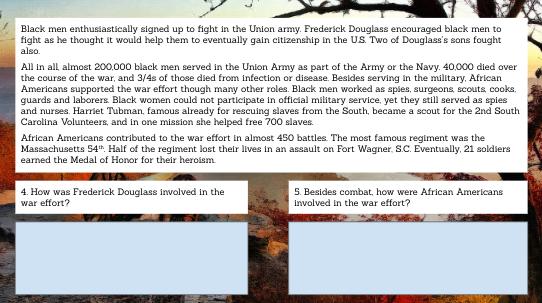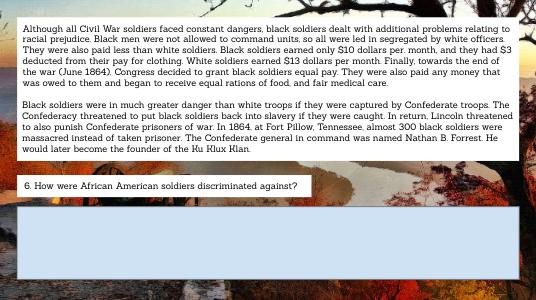Answered step by step
Verified Expert Solution
Question
1 Approved Answer
When the war started, Lincoln was opposed to the emancipation of slaves in the south. Lincoln was most concerned with the preservation of the




When the war started, Lincoln was opposed to the emancipation of slaves in the south. Lincoln was most concerned with the preservation of the Union, and he felt that freeing the slaves of the south would just lead to the border states seceding from the Union. Once the war began, slaves poured into the Union states Others began to follow the Union Army as they made their way from southern states. Without a specific policy regarding runaways, Union commanders were forced to make their own decisions. Some allowed the slaves to stay with the Union, slaves were compelled to return to their owners. Ultimately, on August 6, 1861, the fugitive slaves were officially categorized as "contraband of war by the federal government. The definition of "contraband" was purposely tricky. It said that all slaves who had labored for the Confederacy would be considered free. Of course, all runaway slaves had labored for the Confederacy at some point. Therefore, all runaway slaves were considered to be free. After the bloody Battle of Antietam, Lincoln began to change his thinking towards emancipating the slaves. He was beginning to see emancipation as a necessary tool to win the war. In August. Lincoln allowed for the initial recruitment of 5.000 black soldiers. 1 What were contraband slaves? MEE On July 17. 1862 Congress passed the Second Confiscation and Militia Act This act freed slaves who had masters in the Confederate Army. Two days after, an act of Congress abolished slavery in the territories. Finally. President Abraham Lincoln issued the Emancipation Proclamation on January 1, 1863. The nation was entering its third year of war, and the Proclamation declared that all persons held as slaves" within the rebellious states 'are, and henceforward shall be free. 2 What steps did Congress take to limit slavery before the Emancipation Proclamation? 3. Since the Emancipation didn't really free any slaves, what significance did it hold for the Civil War? Black men enthusiastically signed up to fight in the Union army. Frederick Douglass encouraged black men to fight as he thought it would help them to eventually gain citizenship in the US. Two of Douglass's sons fought also. All in all, almost 200,000 black men served in the Union Army as part of the Army or the Navy. 40,000 died over the course of the war, and 3/4s of those died from infection or disease. Besides serving in the military. African Americans supported the war effort though many other roles. Black men worked as spies, surgeons scouts cooks. guards and laborers. Black women could not participate in official military service, yet they still served as spies and nurses. Harriet Tubman, famous already for rescuing slaves from the South, became a scout for the 2nd South Carolina Volunteers, and in one mission she helped free 700 slaves. African Americans contributed to the war effort in almost 450 battles. The most famous regiment was the Massachusetts 54th Half of the regiment lost their lives in an assault on Fort Wagner, S.C. Eventually, 21 soldiers earned the Medal of Honor for their heroism 4. How was Frederick Douglass involved in the war effort? 5. Besides combat, how were African Americans involved in the war effort? Although all Civil War soldiers faced constant dangers, black soldiers dealt with additional problems relating to racial prejudice. Black men were not allowed to command units, so all were led in segregated by white officers They were also paid less than white soldiers. Black soldiers earned only $10 dollars per month, and they had $3 deducted from their pay for clothing. White soldiers earned $13 dollars per month Finally, towards the end of the war (June 1864). Congress decided to grant black soldiers equal pay. They were also paid any money that was owed to them and began to receive equal rations of food and fair medical care. Black soldiers were in much greater danger than white troops if they were captured by Confederate troops. The Confederacy threatened to put black soldiers back into slavery if they were caught. In return, Lincoln threatened to also punish Confederate prisoners of war. In 1864. at Fort Pillow, Tennessee, almost 300 black soldiers were massacred instead of taken prisoner. The Confederate general in command was named Nathan B. Forrest. He would later become the founder of the Ku Klux Klan 6. How were African American soldiers discriminated against?
Step by Step Solution
★★★★★
3.36 Rating (140 Votes )
There are 3 Steps involved in it
Step: 1
It seems you have provided images containing information about the American Civil War with specific focus on the topic of African American soldiers and the Emancipation Proclamation However what you n...
Get Instant Access to Expert-Tailored Solutions
See step-by-step solutions with expert insights and AI powered tools for academic success
Step: 2

Step: 3

Ace Your Homework with AI
Get the answers you need in no time with our AI-driven, step-by-step assistance
Get Started


